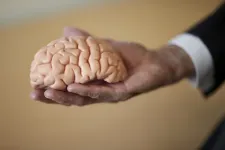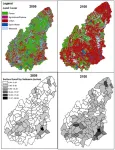(Press-News.org) Interventions aimed at reducing work-related stress for individual healthcare workers may lead to improvements in how people cope with stress up to a year later. Findings from a Cochrane review of the latest available evidence build on the conclusions of a previous review in 2015 that found low-quality evidence that interventions, such as cognitive behavioural training (CBT), mental and physical relaxation, were better than none.
The researchers included 117 studies of the effects of different interventions on stress alleviation in the current review, of which 89 studies were new. These 89 studies were published between 2013 and 2022. A total of 11,119 healthcare workers worldwide were randomised to different interventions, and stress was assessed by questionnaires measuring stress symptoms in the short term (up to three months after an intervention ended), in the medium term (between three and 12 months) and long-term (follow-up after more than a year).
The review from Cochrane, a collaboration of independent, international experts, looked at interventions at the level of the individual healthcare worker that focused attention either on the experience of stress, or away from the experience of stress. Strategies for focusing attention on the stress included CBT, and training on assertiveness, coping and communication skills. Interventions that focus attention away from the stress included relaxation, mindfulness meditation, exercise such as yoga and tai chi, massage, acupuncture, and listening to music. The researchers wanted to see whether different types of interventions were better than no intervention in reducing stress.
The healthcare workers in the studies were experiencing low to moderate levels of stress and burnout, which can lead to physical symptoms such as headaches, muscle tension or pain, but also mental symptoms, such as depression, anxiety, impaired concentration and emotional and relationship problems.
Sietske Tamminga, assistant professor in public and occupational health at Amsterdam University Medical Centre, Amsterdam, The Netherlands, who led the research said: “Healthcare workers often deal with stressful and emotional situations in patient care, human suffering, and pressure from relationships with patients, family members and employers, as well as high work demands and long working hours.
“We found that healthcare workers might be able to reduce their stress by means of individual-level interventions such as cognitive behaviour training, exercising or listening to music. This may be beneficial for the healthcare workers themselves and it may spill over to the patients they care for, and the organisations they work for. The effect may last for up to a year and a combination of interventions may be beneficial as well, at least in the short term. Employers should not hesitate to facilitate a range of stress interventions for their employees. The long-term effects of stress management interventions remain unknown.”
The researchers say that larger, better-quality studies are needed to look at both the short- and long-term effects of individual level interventions in order to increase the certainty of the evidence.
“We need more studies on interventions addressing work-related risk factors both at the individual and organisational level,” said Dr Tamminga. “It might be even more beneficial to improve working conditions themselves, instead of only helping individuals to deal better with heavy psychosocial burdens. For example, employers could address problems of understaffing, over-work and anti-social shift patterns. If you’re dedicated to change, you need to change the underlying risk factors rather than focusing on the symptoms.”
Limitations of the research include: the estimates of the effects of individual-level stress management interventions may be biased because of a lack of blinding of the participants in the included studies; many studies were small; and there were too few studies that focused on specific factors that can cause stress in the workplace.
Studies have reported that between 30% to 70% of physicians and nurses and 56% of anaesthesiologists experience burnout symptoms as a result of their work. Previous research has tended to focus on a particular type of intervention in specific groups of healthcare workers. The authors of this Cochrane review write: “To the best of our knowledge there are no up-to-date reviews that examine the effectiveness of various types of individual-level interventions aimed at reducing stress in various healthcare workers to provide a more complete overview.”
Dr Tamminga concluded: “There is already a shortage of healthcare workers due to high turnover rates, and effective prevention of stress and burnout may help to reduce this.”
END
Stress-management interventions may help individual healthcare workers for at least a year
Interventions aimed at reducing work-related stress for individual healthcare workers may lead to improvements in how people cope with stress up to a year later.
2023-05-12
ELSE PRESS RELEASES FROM THIS DATE:
Research pinpoints the time of year and hour when people have the strongest suicidal thoughts
2023-05-12
New research has identified the month when people have the strongest suicidal thoughts, and that these thoughts occur a few months before the peak of suicide behaviours in spring/early summer. It also showed the daily peak in suicidal thought is between 4-5 am.
Most people assume suicide rates will be highest in winter, yet spring/early summer is when suicidal behaviours peak and this finding has baffled researchers since first identified.
Research from the University of Nottingham’s School of Psychology, led in collaboration with the University of Amsterdam and Harvard University, ...
AI study finds that patients with Parkinson’s disease speak differently to healthy patients
2023-05-12
Using artificial intelligence (AI) to process natural language, a research group evaluated the characteristics of speech among patients with Parkinson’s disease (PD). AI analysis of their data determined that these patients spoke using more verbs and fewer nouns and fillers. The study was led by Professor Masahisa Katsuno and Dr. Katsunori Yokoi, Nagoya University Graduate School of Medicine, in collaboration with Aichi Prefectural University and Toyohashi University of Technology. They published their results ...
Astronomers reveal the largest cosmic explosion ever seen
2023-05-12
A team of astronomers led by the University of Southampton have uncovered the largest cosmic explosion ever witnessed.
The explosion is more than ten times brighter than any known supernova (exploding star) and three times brighter than the brightest tidal disruption event, where a star falls into a supermassive black hole.
The explosion, known as AT2021lwx, has currently lasted over three years, compared to most supernovae which are only visibly bright for a few months. It took place nearly 8 billion light years away, when the universe was around 6 billion years old, and is still being detected by a network of telescopes.
The researchers believe that the explosion is ...
Scientists find fire records inside sand dunes
2023-05-12
A previously unrecognised sedimentary archive in sand dunes could unlock a repository of fire records, a discovery that could expand fire histories across the globe.
The research, conducted by Dr Nicholas Patton during his PhD at The University of Queensland, has solved a persistent problem facing historians investigating changing fire patterns.
“Knowing how the frequency and intensity of wildfires has changed over time offers scientists a glimpse into Earth’s past landscapes, as well as an understanding of future climate change impacts,” Dr Patton said.
“To reconstruct fire records, researchers usually rely heavily ...
Brain-belly connection: gut health may influence likelihood of developing Alzheimer’s
2023-05-11
Could changing your diet play a role in slowing or even preventing the development of dementia? We’re one step closer to finding out, thanks to a new UNLV study that bolsters the long-suspected link between gut health and Alzheimer’s disease.
The analysis — led by a team of researchers with the Nevada Institute of Personalized Medicine (NIPM) at UNLV and published this spring in the Nature journal Scientific Reports — examined data from dozens of past studies into the belly-brain connection. The results? There’s a strong link between particular kinds of gut bacteria and Alzheimer’s disease.
Between 500 and 1,000 species of bacteria ...
New research from UMass Amherst links changes in land use to water quality and quantity
2023-05-11
AMHERST, Mass. – Researchers at the University of Massachusetts Amherst recently published a study in the journal PLOS Water that focuses on the Sudbury-Assabet and Concord watershed in eastern Massachusetts, and which links hydrological changes, including floods, drought and runoff, to changing patterns of land use.
“We all live in a watershed” says Timothy Randhir, professor of environmental conservation at UMass Amherst and the paper’s senior author. “We’re constantly modifying our landscape, turning what were once forests into ...
UC Irvine study shows traffic-related air pollution in Irvine weakens brain function
2023-05-11
Irvine, Calif., May 11, 2023 – Researchers from the University of California, Irvine have found that exposure to traffic-related air pollution in Irvine led to memory loss and cognitive decline and triggered neurological pathways associated with the onset of Alzheimer’s disease.
“The link between air pollution and Alzheimer’s disease is concerning, as the prevalence of toxicants in ambient air is not just on the rise globally, but also hitting close to home here in Irvine,” said corresponding ...
Bail reform law in New York had negligible effect on increases in crime
2023-05-11
Across the United States, legislators and the public have debated the issue of bail reform, which aims to reduce pretrial jail populations by eliminating cash bail. New York State passed legislation in 2019 to limit the use of money bail and expand pretrial release. In a new study, researchers evaluated the effect of the law on state crime rates, considering the effect of the COVID-19 pandemic. Although rates of murder, larceny, and motor vehicle theft rose after the bail reform law went into effect, none of the increases were statistically significant when compared with a control group. This suggests that the effect of bail reform on crime rate increases was negligible.
The study, ...
The science of attraction: why do we fall for certain people?
2023-05-11
Sometimes life’s most meaningful relationships grow from the briefest of connections. Like when you go to a party and meet someone wearing your favorite band’s T-shirt, or who laughs at the same jokes as you, or who grabs that unpopular snack you alone (or so you thought) love. One small, shared interest sparks a conversation—that’s my favorite, too!—and blossoms into lasting affection.
This is called the similarity-attraction effect: we generally like people who are like us. Now, new findings from a Boston ...
Estimated annual spending on Lecanemab and its ancillary costs in the Medicare program
2023-05-11
About The Study: Lecanemab and associated ancillary services could add an estimated $2 billion to $5 billion annually to Medicare spending with substantial out-of-pocket costs for beneficiaries lacking supplemental coverage, according to a cost analysis using nationally representative survey data. Lecanemab, an antidementia medication with modest clinical benefit, received accelerated Food and Drug Administration approval.
Authors: John N. Mafi, M.D., M.P.H., of the David Geffen School of Medicine at the University of California, Los Angeles, is the corresponding ...
LAST 30 PRESS RELEASES:
Gut microbiome connected with heart disease precursor
Nitrous oxide, a product of fertilizer use, may harm some soil bacteria
FAU lands $4.5M US Air Force T-1A Jayhawk flight simulator
SimTac: A physics-based simulator for vision-based tactile sensing with biomorphic structures
Preparing students to deal with ‘reality shock’ in the workplace
Researchers develop beating, 3D-printed heart model for surgical practice
Black soldier fly larvae show promise for safe organic waste removal
People with COPD commonly misuse medications
How periodontitis-linked bacteria accelerate osteoporosis-like bone loss through the gut
Understanding how cells take up and use isolated ‘powerhouses’ to restore energy function
Ten-point plan to deliver climate education unveiled by experts
Team led by UC San Diego researchers selected for prestigious global cancer prize
Study: Reported crop yield gains from breeding may be overstated
Stem cells from human baby teeth show promise for treating cerebral palsy
Chimps’ love for crystals could help us understand our own ancestors’ fascination with these stones
Vaginal estrogen therapy not linked to cancer recurrence in survivors of endometrial cancer
How estrogen helps protect women from high blood pressure
Breaking the efficiency barrier: Researchers propose multi-stage solar system to harness the full spectrum
A new name, a new beginning: Building a green energy future together
From algorithms to atoms: How artificial intelligence is accelerating the discovery of next-generation energy materials
Loneliness linked to fear of embarrassment: teen research
New MOH–NUS Fellowship launched to strengthen everyday ethics in Singapore’s healthcare sector
Sungkyunkwan University researchers develop next-generation transparent electrode without rare metal indium
What's going on inside quantum computers?: New method simplifies process tomography
This ancient plant-eater had a twisted jaw and sideways-facing teeth
Jackdaw chicks listen to adults to learn about predators
Toxic algal bloom has taken a heavy toll on mental health
Beyond silicon: SKKU team presents Indium Selenide roadmap for ultra-low-power AI and quantum computing
Sugar comforts newborn babies during painful procedures
Pollen exposure linked to poorer exam results taken at the end of secondary school
[Press-News.org] Stress-management interventions may help individual healthcare workers for at least a yearInterventions aimed at reducing work-related stress for individual healthcare workers may lead to improvements in how people cope with stress up to a year later.





